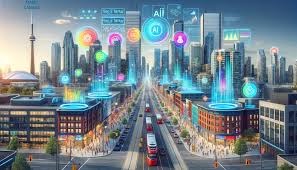AI in Smart Cities
Enhancing Urban Planning
Artificial Intelligence (AI) is rapidly transforming various aspects of our lives, and smart cities are no exception. AI is playing a crucial role in enhancing urban planning and infrastructure management, making cities more efficient, sustainable, and livable.
AI in Smart Cities: Enhancing Urban Planning and Infrastructure Management
AI in Smart Cities: Enhancing urban planning and infrastructure management.
Table of Contents
- AI in Smart Cities
- Enhancing urban planning
- Infrastructure management
AI in Smart Cities
Artificial Intelligence (AI) is rapidly transforming various aspects of our lives, and smart cities are no exception. AI is playing a crucial role in enhancing urban planning and infrastructure management, making cities more efficient, sustainable, and livable.
Enhancing Urban Planning
AI can analyze vast amounts of data from various sources, including traffic patterns, demographics, and environmental factors, to identify trends and patterns that are otherwise difficult to detect. This data can be used to:
- Optimize transportation systems: AI can help manage traffic flow, optimize public transportation routes, and predict congestion hotspots, leading to reduced travel time and improved commutes.
- Develop sustainable urban designs: By analyzing environmental data, AI can help planners create sustainable urban designs that minimize the impact on the environment and conserve resources.
- Create more equitable and inclusive cities: AI can identify areas with limited access to essential services and infrastructure, enabling policymakers to address disparities and create more equitable cities.
Infrastructure Management
AI is also revolutionizing infrastructure management, making it more efficient and cost-effective. Here are some key applications:
- Predictive maintenance: By analyzing sensor data from infrastructure assets, AI can predict potential failures and schedule maintenance proactively, reducing downtime and costs.
- Smart grids: AI can optimize energy distribution and consumption in smart grids, improving efficiency and reducing energy waste.
- Water management: AI can help manage water resources efficiently, optimizing water distribution and detecting leaks.
Summary
- AI is transforming smart cities by enhancing urban planning and infrastructure management.
- AI can analyze data to optimize transportation systems, develop sustainable designs, and create equitable cities.
- AI can be used for predictive maintenance, smart grids, and water management, making infrastructure more efficient and cost-effective.
